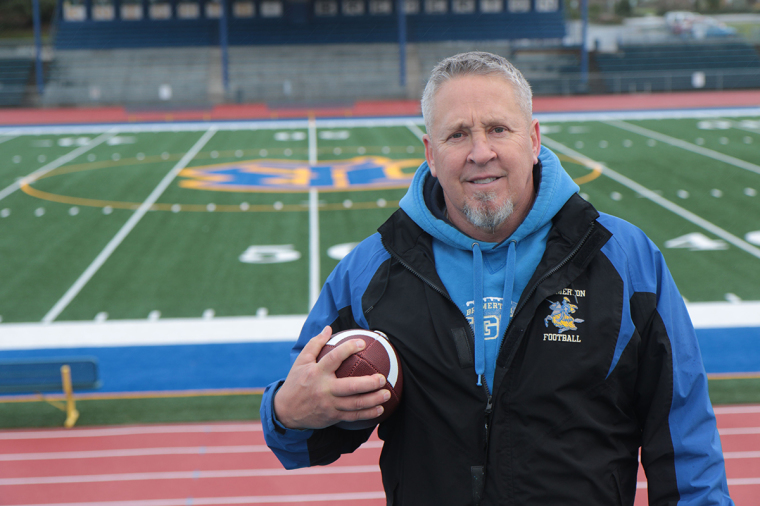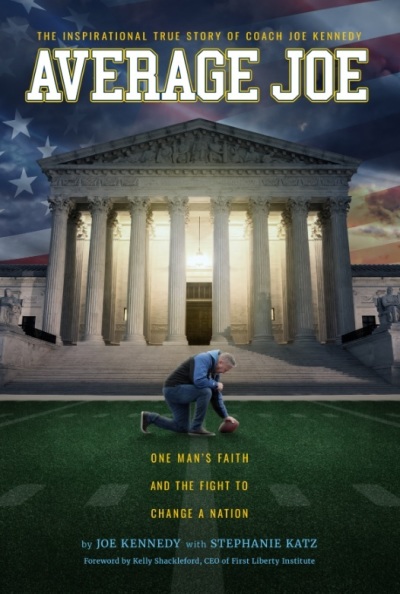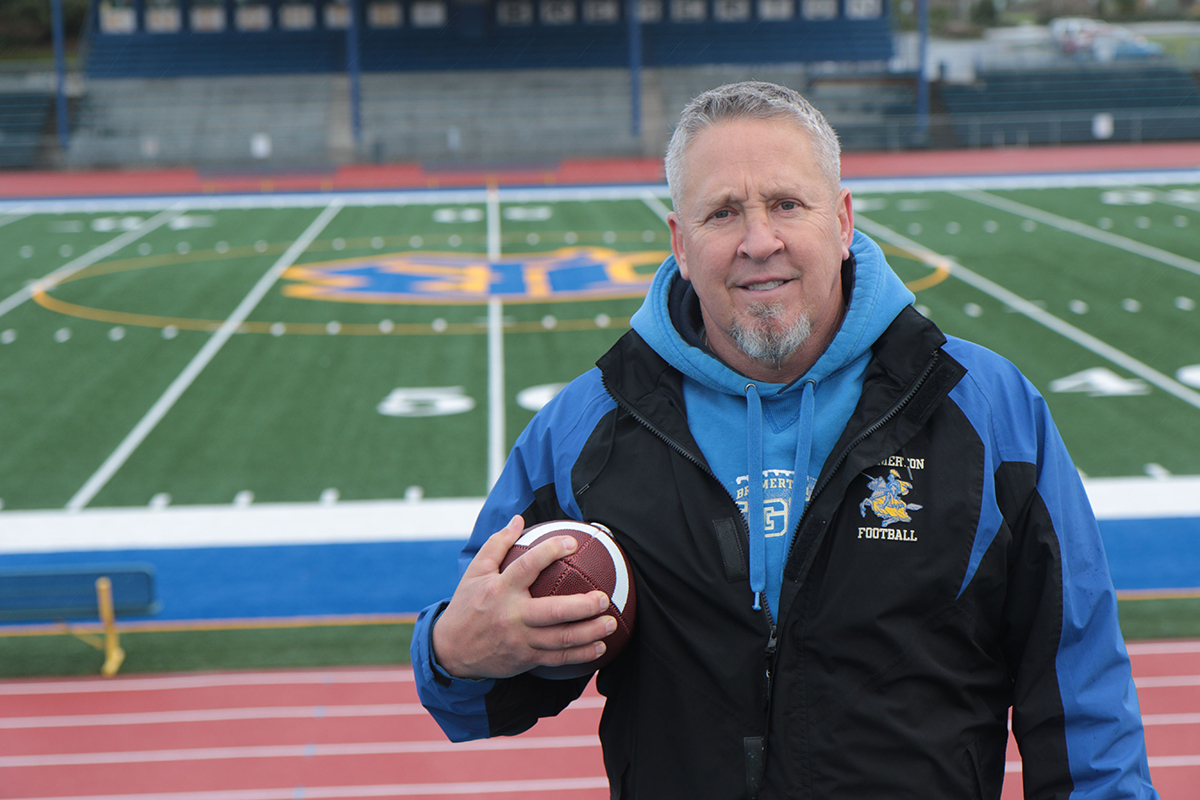
The Washington state high school football coach at the center of a major United States Supreme Court decision on Christian prayer at public schools will soon be releasing a book about his life and the high-profile case.
Joe Kennedy, the former football coach at Bremerton High School who initially lost his job because of his practice of praying at the 50-yard-line following games, has written a book titled Average Joe, which is slated for release on Oct. 24.
In it, Kennedy describes the behind-the-scenes experiences he had over the course of eight years, from when he filed his lawsuit against the school district until the Supreme Court ruled 6-3 last year that school officials were wrong to punish him.
“Kennedy prayed during a period when school employees were free to speak with a friend, call for a reservation at a restaurant, check email, or attend to other personal matters. He offered his prayers quietly while his students were otherwise occupied. Still, the Bremerton School District disciplined him anyway,” wrote Supreme Court Justice Neil Gorsuch for the majority.
“Both the Free Exercise and Free Speech Clauses of the First Amendment protect expressions like Mr. Kennedy’s … The Constitution and the best of our traditions counsel mutual respect and tolerance, not censorship and suppression, for religious and nonreligious views alike.”

In Average Joe, Kennedy documents a lot of lesser-known aspects about the case, such as the fact that his wife was working for the school district throughout the litigation, causing much stress in their marriage.
Kennedy acknowledged in the book that he had no previous experience as a football coach before getting the job at Bremerton, but was inspired to take the post after watching the Christian film “Facing the Giants.”
Kennedy also wrote about the tumultuous parts of his life, such as having issues with his adopted family growing up, being expelled from several schools, getting into fights as a child, serving as a Marine in the First Gulf War, and having two failed marriages.
The Christian Post talked with Kennedy about his book, the work being done on a film about his life, and why, after being reinstated, he quit his job as a football coach after one game. Below are excerpts from the interview.
CP: Why did you decide to write this book?
Kennedy: Well, I wanted to be able to tell my whole story.
So many people will end up just seeing a headline or a social media post, and when I started talking to people, I had to tell the same story over and over again. And I just thought, “Man, this really needs to be written down.”
The way we started was just a simple explanation, and then we ended up figuring we needed to talk to everybody and share this message because it’s really powerful; it’s motivating; and hopefully, it will inspire a lot of people.
CP: In the book, you write about your troubled upbringing, which included being expelled from several schools and problems at home. Why did you think it was important to mention these things?
Kennedy: Because most people go through stuff when they’re younger and they get defined by their past. I never wanted to be held back by my past and to really show people that even the most troubled people in the world can end up being used by God for some amazing things.
The average person can just get up and be a change in the world, instead of just going through life.
CP: If one of your critics were to pick up and read your book, what do you think they would find to be the most surprising or one of the most surprising things about you?
Kennedy: I think they would be mostly surprised by the reason why I stood up for what I did and why a simple prayer was so important to me.
I think they’ll understand this was really a constitutional, free speech and free exercise side. This was something that was near and dear to my heart, there wasn’t really a Christian side of it.
A never-say-die guy who was standing up for the rights of all Americans.
CP: In the book, you devoted a whole chapter to your experiences as a coach, titled “Father to the Fatherless.” How did you serve as a father to the fatherless of your football team?
Kennedy: Most of my team had single parents. Bremerton is a really blue-collar town. A lot of single families are there. And these parents are doing the best they can and the ones that are together are working to put food on the table and to be able to provide for their family.
There’s something about a coach that can actually get through to kids because I had a hard time with my children [too].
I felt like I was a terrible dad to them, and my wife would always kind of half-jokingly say, “I wish you were half as good of a dad to our kids as you are to these guys.” So, I got to be the role model and the mentor and, really, the only thing I focused on was communicating to the young men to become better young men, work on leadership with them, and prep them to become adults.
CP: While you won at the Supreme Court and were able to get your old coaching job back, you ended up working only one game before quitting. After all of that effort to get your coaching job back, why quit after one game?
Kennedy: There are multiple reasons.
This was something we’ve been fighting for for eight years and a lot has changed over the years.
I fought so hard to just get back onto the football field so, in the spring, when I came back to Bremerton for spring ball, I got held up with nothing but red tape and it was very frustrating that I didn’t get to even take a step out onto the field with my guys.
And then, this fall, nobody was really happy with me coming back and that was very apparent. So, I did the whole fall camp with them, and then after the first game, my wife and I started talking that, “Wow, we finally finished this race. What’s next?”
So, we started praying and discussing it, just the two of us. And, I went to practice on Monday, and things were good. Tuesday, we got some test results back from my father-in-law down here in Pensacola, Florida.
It seemed like the right thing to do at the right time for both of us, well actually for all of us, for the school, for me, for my wife, for my father-in-law.
I wanted to go out on my own terms, but I didn’t know when that was going to be. So, this seemed like the absolutely perfect time to do it.
CP: To be clear, one of the reasons was that your father-in-law is dealing with a bad illness and he lives in Florida?
Kennedy: Yes, that’s why we moved to Florida about three years ago was because that’s where he’d been residing. He has nobody else except for my wife, [who] is the only survivor left of the family. So, we’re down here taking care of him until his days are over.
CP: Is it true that there is going to be a movie about your life?
Kennedy: This has been in talks for years and years. The guys that did “God’s Not Dead” had a vision to tell this story. I always thought that this would be a great one for “Facing the Giants 2” since that movie with the Kendrick brothers really spoke to my heart and changed my life.
They started filming two weeks ago.
My wife and I have been on the set and we talked with the director and the actors to give them insight into our lives, on how we felt during these things.
It’s kind of freaky because it exposes our whole entire life: all the great things, but also some of the things that we never wanted to deal with ever again.
CP: What do you hope readers take away from your book?
Kennedy: I hope they take away that everybody matters. Everybody should be inspired to do something with their life. There’s nothing special about me.
Not to sound really cliché, but I really am an average guy. There’s nothing remarkable about me. But God can take a person like me, and just change the whole trajectory of the United States and bring God right back into the public schools. That’s pretty amazing. So, if people got involved and they let God use them, it’s going to be amazing to see what happens to America over the next few years.




























![[Video] More – Aghogho » GospelHotspot](https://gospelhotspot.net/wp-content/uploads/2024/04/More-Aghogho.jpeg)
















